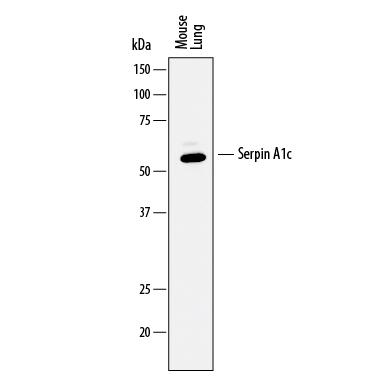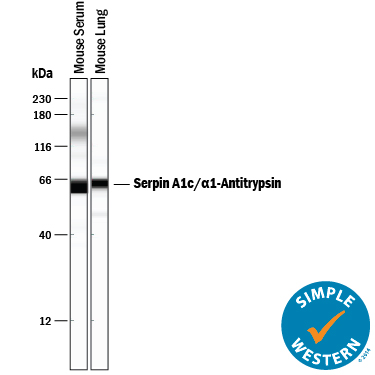Mouse Serpin A1c/ alpha 1-Antitrypsin Antibody
Mouse Serpin A1c/ alpha 1-Antitrypsin Antibody Summary
Glu25-Lys413
Accession # NP_033271
Applications
Please Note: Optimal dilutions should be determined by each laboratory for each application. General Protocols are available in the Technical Information section on our website.
Scientific Data
 View Larger
View Larger
Detection of Mouse Serpin A1c/ alpha 1‑Antitrypsin by Western Blot. Western blot shows lysates of mouse lung tissue. PVDF membrane was probed with 0.5 µg/mL of Goat Anti-Mouse Serpin A1c/a1-Antitrypsin Antigen Affinity-purified Polyclonal Antibody (Catalog # AF2979) followed by HRP-conjugated Anti-Goat IgG Secondary Antibody (Catalog # HAF017). A specific band was detected for Serpin A1c/a1-Antitrypsin at approximately 55 kDa (as indicated). This experiment was conducted under reducing conditions and using Immunoblot Buffer Group 1.
 View Larger
View Larger
Detection of Mouse Serpin A1c/ alpha 1‑Antitrypsin by Simple WesternTM. Simple Western lane view shows mouse serum and lysates of mouse lung tissue, loaded at 0.2 mg/mL. A specific band was detected for Serpin A1c/a1-Antitrypsin at approximately 62 kDa (as indicated) using 5 µg/mL of Goat Anti-Mouse Serpin A1c/a1-Antitrypsin Antigen Affinity-purified Polyclonal Antibody (Catalog # AF2979) followed by 1:50 dilution of HRP-conjugated Anti-Goat IgG Secondary Antibody (Catalog # HAF109). This experiment was conducted under reducing conditions and using the 12-230 kDa separation system.
Reconstitution Calculator
Preparation and Storage
- 12 months from date of receipt, -20 to -70 °C as supplied.
- 1 month, 2 to 8 °C under sterile conditions after reconstitution.
- 6 months, -20 to -70 °C under sterile conditions after reconstitution.
Background: Serpin A1c/alpha 1-Antitrypsin
SerpinA1c (serine proteinase inhibitor-clade A 1c; also alpha-1 protease inhibitor 6 and alpha1 antitrypsin 1-3) is a secreted, 50-55 kDa glycoprotein member of the clade A-subfamily, serpin superfamily of protease inhibitors. There are multiple sources for serpinA1. The circulating form of serpinA1 is expressed by hepatocytes, while local production occurs in the bone marrow by osteoblasts, PMNs, T cells and B cells. SerpinA1 is a naturally occurring serine protease inhibitor. Its principal activity seems to be that of neutralizing neutrophil elastase, an activity that protects the elasticity of the lung during inflammation. It is also posited to play a role in bone marrow progenitor mobilization. Here, it promotes HPC proliferation by blocking cytokine degradation, and interferes with HPC migration by blocking protease cleavage of engaged cell adhesion molecules. Mature mouse serpinA1c is 389 amino acids (aa) in length (aa 25-413) (GenBank#:NP_033271) and contains one active enzymatic site (aa 67-410). Unlike human and rat, the mouse genus contains anywhere from one to seven serpinA1genes. Mus caroli (an Asian species) possesses one gene, Mus saxicola (a south asia species) possesses four genes, and Mus musculus possesses six or more distinct genes. Within Mus musculus, various strains have variable numbers of active genes. While highly homologous, the protein sequences are not identical, and differ most importantly in the reactive center loop region (aa 374-386). The protein referenced here is equivalent to alpha 1-PI-3 (Borriello, F & K.S. Krauter [1991] Proc. Natl. Acad. Sci. USA 88:9417). This gene has one isoform with minimal scattered substitutions and shows more that 98% aa sequence identity (GenBank #:Q00896). Over aa 25-413, serpinA1c/ alpha 1-IP-3 shares 97% and 95% aa sequence identity with serpinA1a/ alpha 1-PI-1 and serpinA1b/ alpha 1-IP-2, respectively. It also shares 77% and 64% aa sequence identity with rat and human serpinA1, respectively.
Product Datasheets
Citation for Mouse Serpin A1c/ alpha 1-Antitrypsin Antibody
R&D Systems personnel manually curate a database that contains references using R&D Systems products. The data collected includes not only links to publications in PubMed, but also provides information about sample types, species, and experimental conditions.
1 Citation: Showing 1 - 1
-
A combined in silico and in vitro study on mouse Serpina1a antitrypsin-deficiency mutants
Authors: R Eggenschwi, A Patronov, J Hegermann, M Fráguas-Eg, G Wu, L Cortnumme, M Ochs, I Antes, T Cantz
Sci Rep, 2019-05-16;9(1):7486.
Species: Mouse
Sample Types: Cell Lysates, Whole Cells
Applications: ICC, Western Blot
FAQs
No product specific FAQs exist for this product, however you may
View all Antibody FAQsReviews for Mouse Serpin A1c/ alpha 1-Antitrypsin Antibody
There are currently no reviews for this product. Be the first to review Mouse Serpin A1c/ alpha 1-Antitrypsin Antibody and earn rewards!
Have you used Mouse Serpin A1c/ alpha 1-Antitrypsin Antibody?
Submit a review and receive an Amazon gift card.
$25/€18/£15/$25CAN/¥75 Yuan/¥2500 Yen for a review with an image
$10/€7/£6/$10 CAD/¥70 Yuan/¥1110 Yen for a review without an image

